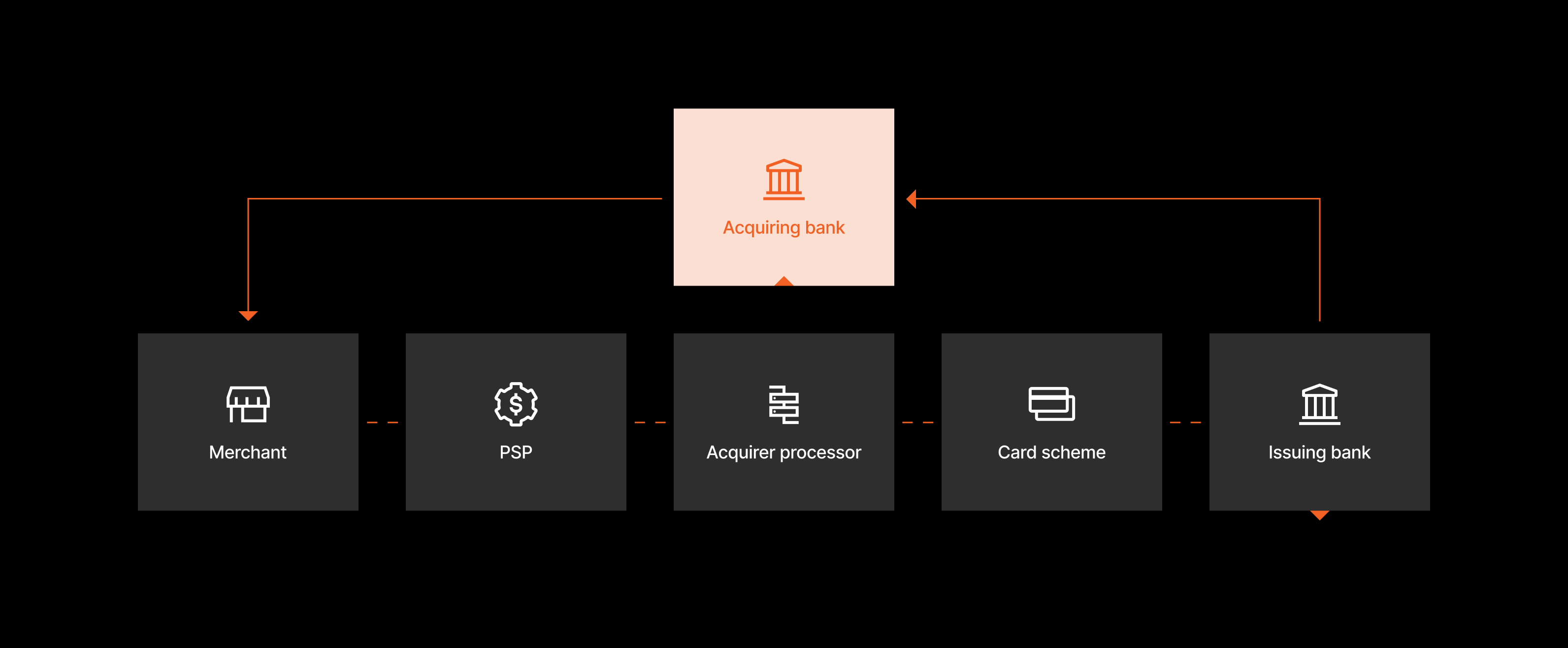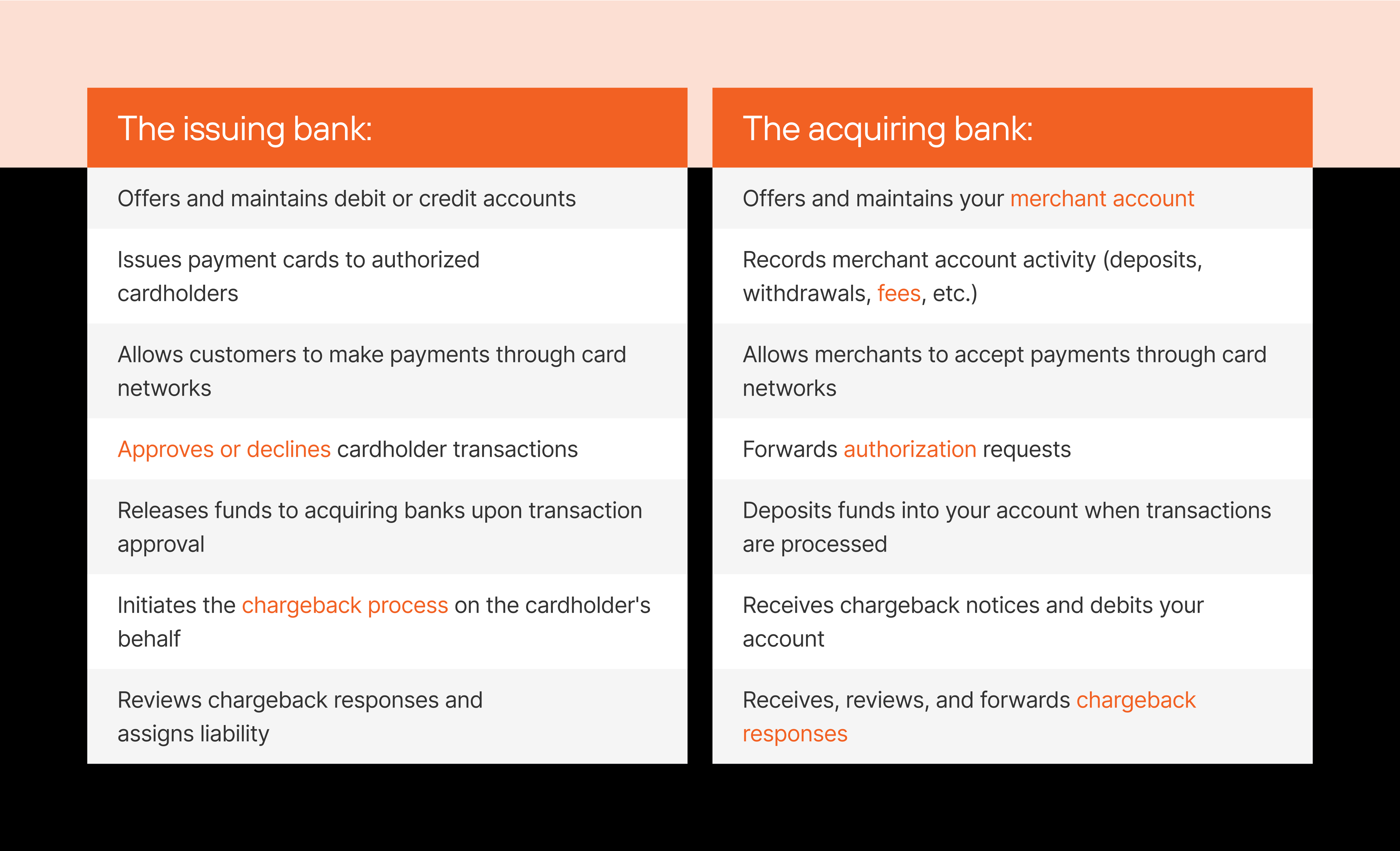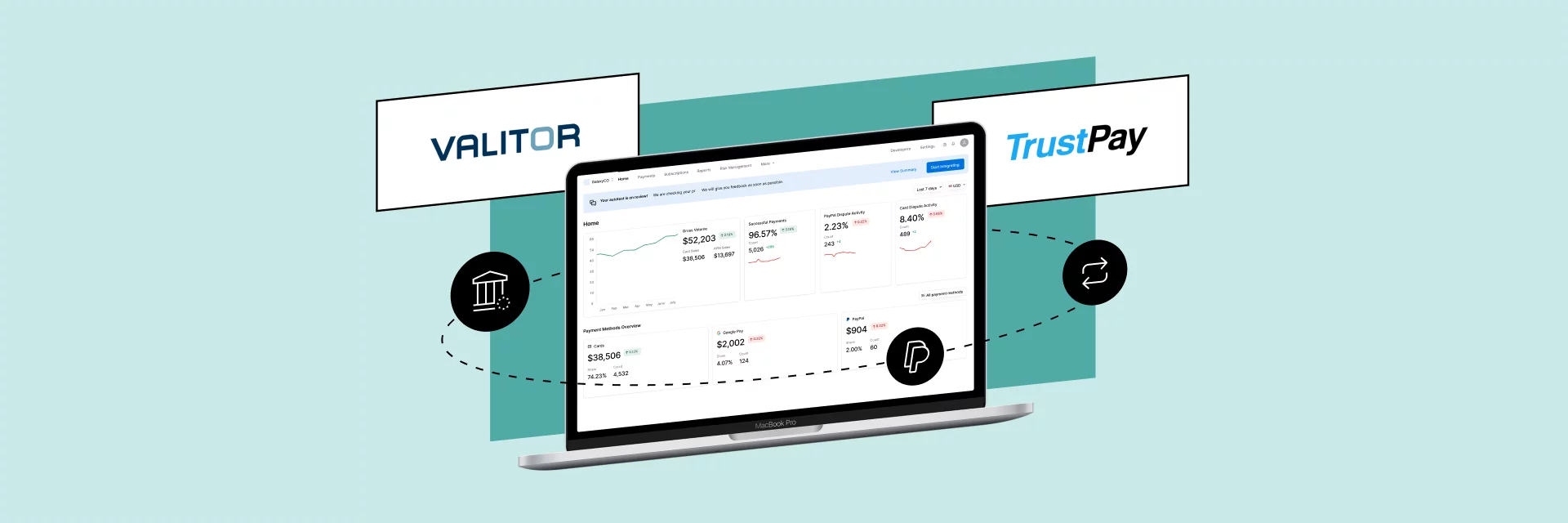The top 150 global acquirers process over 400 billion transactions every year and provide the engine behind online commerce by facilitating seamless transactions. These financial institutions act as the backbone of payment processing, connecting businesses and consumers and enabling the smooth flow of funds. With the surge in online transactions and e-commerce, acquiring banks have become indispensable for businesses of all sizes, offering a wide array of benefits and services that drive economic growth and financial inclusivity. In this article, we will look into the importance of acquiring banks and shed light on how their innovative solutions and secure infrastructure empower businesses to thrive in the modern era of digital commerce.
Table of Contents
Acquiring Bank – Definition and Function

An acquiring bank is a bank that helps businesses to facilitate credit/debit card payments and handles funds settlement. Here’s how acquiring banks function and how credit card acquiring works:
- Merchant Account Setup: The first step is for the merchant to establish a merchant account with a bank acquirer. This involves providing necessary business information, such as company details, financial history, and projected transaction volume. The bank evaluates the merchant’s application and, upon approval, sets up the merchant’s account.
- Payment Acceptance: Once the merchant account is established, the acquiring bank provides the necessary infrastructure for payment acceptance. This may include physical POS terminals for in-person transactions or an online payment gateway for e-commerce transactions. These payment acceptance channels securely capture customer payment information.
- Transaction Authorization: When a customer makes a payment, the merchant acquirer receives the payment authorization request from the merchant. The bank communicates with the customer’s issuing bank (the bank that issued the customer’s payment card) to verify the transaction details, such as the card’s validity, available credit, and the customer’s account status. The acquiring bank receives an authorization code or declines a response from the issuing bank.
- Funds Settlement: If the transaction is authorized, the acquirer starts the process of funds settlement. The bank facilitates the transfer of funds from the customer’s issuing bank to the merchant’s account. This typically occurs within a specified timeframe, which may vary depending on factors such as the payment network and the merchant agreement.
- Fee Deductions: As part of the payment processing services, the acquiring bank deducts fees from the settled funds. These fees typically include transaction fees, interchange fees (charged by the card networks), and any additional charges based on the merchant agreement. The remaining funds are then deposited into the merchant’s designated account.
What’s the Acquirer’s Role in the Transaction Flow?
Simply said, as a merchant, you will deal directly with a PSP (payment service provider) while your acquiring bank will handle the funds.
Here’s a more in-depth look at the transaction flow process and the number of roles involved:
For instance, you have just received a payment from your payment service provider or an online payment processor. The transaction is pending. But what comes next?
- Payment service providers (PSPs) establish a connection with the acquirer payment processor, which then submits a payment authorization request to the relevant card schemes.
- The request is submitted to issuing bank.
- A customer’s financial institution verifies whether sufficient funds or credit are available or not to process the requested purchase.
- The acquirer will reclaim the funds once the transaction has been approved. The acquirer will keep the funds in the merchant account they create for your business (less any transaction fees). The funds should appear in your business account during the next few days.
- The acquirer is informed of denied payment and given details as to why it was declined if the transaction is not approved.
So, due to the diversity of parties and functions involved, it may be tricky to determine who is liable for a particular aspect of the transaction flow.
A PSP, for instance, can facilitate the acquiring services and payment processing necessary for accepting payments. Conveniently, you only need to deal with a single PSP to handle all your payment processing needs. However, it can be confusing to determine which acquiring bank and acquirer processor is powering the PSP’s service.
Why You Should Consider Using an Acquiring Bank
An acquiring bank can help your business win new customers and boost revenue while at the same providing a safer and smoother shopping experience for your customers. Here are the key reasons you should work with an acquiring bank:
- Payment Acceptance: The acquiring bank provides your business with the necessary infrastructure and technology to accept electronic payments. This includes setting up merchant accounts for businesses, which allow them to receive funds from debit and credit card transactions.
- Point-of-Sale (POS) Terminals or Payment Gateways: The acquiring bank provides businesses with POS terminals or payment gateways, depending on the payment channel used. These terminals or gateways securely capture payment data from customers and transmit it to the bank’s processing network.
- Reduce Chargebacks: When a customer makes a payment, the acquiring bank receives the payment authorization request from the merchant. It verifies the transaction details, such as the cardholder’s account status, available credit, and validity of the card, by communicating with the cardholder’s issuing bank.
- Funds Settlement: An acquiring bank ensures a fast and secure transfer from the customer’s issuing bank to your merchant account.
- Risk Management and Security: Acquiring banks play a crucial role in managing the risks associated with payment processing. They implement security measures and fraud detection systems to minimize the likelihood of fraudulent transactions. They also adhere to best practices, such as PCI DSS, to ensure the protection of sensitive payment data.
- Reporting and Analytics: Acquiring banks provide merchants with reporting and analytics tools to monitor their payment activity, track sales performance, and gain insights into customer behavior. This information can be valuable for businesses in optimizing their operations and making informed decisions.
What’s the Difference Between Acquiring Bank and Issuing Bank?
The main difference between an acquiring bank and an issuing bank is their role and the perspective from which they operate within the payment ecosystem. Here are the key distinctions between acquiring bank vs issuing bank:

Acquiring Bank:
- Role: An acquiring bank acts as an intermediary between merchants and the payment networks. It enables businesses to accept electronic payments from customers.
- Customer Relationship: The acquiring bank has a business-to-business relationship with the merchant. It provides payment processing services to the merchant, facilitating payment acceptance and settlement.
- Payment Acceptance: Acquiring banks set up and maintain merchant accounts, providing the necessary infrastructure, such as POS terminals or online payment gateways, to accept various payment methods.
- Transaction Authorization: Acquiring banks receive payment authorization requests from merchants, verify transaction details, and communicate with the customer’s issuing bank to approve or decline the transaction.
- Funds Settlement: Acquiring banks facilitate the transfer of funds from the customer’s issuing bank to the merchant’s account upon transaction approval.
- Fees: Acquiring banks deduct fees, including transaction fees and interchange fees, from the settled funds as compensation for their services.
- Risk Management: Acquiring banks implement security measures, fraud detection systems, and compliance procedures to protect against fraudulent activities during payment processing.
Issuing Bank:
- Role: The financial institution that issues credit/debit cards to buyers.
- Customer Relationship: The issuing bank has a direct relationship with the cardholder or customer.
- Card Issuance: Issuing banks provide payment cards to customers, including physical cards and virtual cards for online transactions.
- Account Management: Issuing banks maintain customer accounts, handle card activation, set credit limits, and manage cardholder information.
- Transaction Authorization: Issuing banks receive payment authorization requests from acquiring banks when customers use their payment cards for transactions. They verify the cardholder’s account status, available credit, and other transaction details.
- Funds Provision: Issuing banks are responsible for providing the funds required to complete approved transactions.
- Customer Service: Issuing banks handle customer inquiries, disputes, and other card-related issues.
The acquiring bank focuses on facilitating payment acceptance for merchants, while the issuing bank primarily deals with issuing payment cards to customers and managing the associated accounts. The acquiring bank is involved in payment processing and settlement, while the issuing bank is involved in card issuance and account management for cardholders.
Merchant Acquirer Vs. Payment Processor
In this case, the payment processor’s role is purely technological. The processor is responsible for acquiring and submitting the customer’s payment card data to the relevant card scheme networks.
Your acquirer’s function differs. It communicates with financial entities to retrieve funds and ensure you get the full amount for your customers’ purchases.
Choosing the Right Acquiring Bank for Your Business
When choosing merchant acquiring banks, here are some key considerations to think about:
- Reputation and Trustworthiness: Look for a bank with a solid reputation and a track record of trustworthiness. Research the bank’s history, financial stability, and any regulatory issues or legal concerns they may have faced.
- Payment Processing Capabilities: Ensure that they support a range of payment methods including credit/debit cards, mobile payments, and online payment gateways. And make sure they can handle your transaction volume efficiently and securely.
- Pricing Structure and Fees: Understand the merchant acquiring service’s pricing structure, including transaction fees, setup fees, monthly fees, and any other charges. Compare these costs with other banks to ensure they align with your budget and projected transaction volume.
- Contract Terms and Conditions: Pay attention to the length of the contract, any termination fees, reserve requirements, and any other contractual obligations. Ensure that the contract terms are fair and reasonable for your business.
- Security: Evaluate the bank’s security measures, including encryption protocols, fraud detection systems, and compliance with PCI DSS requirements.
- Customer Support: Find a bank that offers reliable customer support, accessible representatives, and a responsive support system to address any payment-related issues or inquiries promptly.
- Integration and Compatibility: Consider whether the bank offers seamless integration options with your current payment processing setup or if additional development work will be required.
- Industry Knowledge: Research whether the bank has experience working with businesses similar to yours and see if they provide tailored solutions.
- Global Reach: Look for banks that support multi-currency transactions, have partnerships with international payment networks, and can facilitate cross-border payments efficiently.
- References and Recommendations: Seek references and recommendations from other businesses in your industry or network that have worked with the acquiring bank you are considering. Their experiences and insights can help you gauge the bank’s performance and reliability.
Fees and Charges
The fees and charges levied by acquiring banks can vary based on several factors, including the specific bank, the merchant’s industry, the transaction volume, and the negotiated terms of the merchant agreement. Here are examples of typical fees and charges associated with acquiring banks based on major banks:
- Transaction Fees: Acquiring banks charge a fee for each transaction processed. This fee is usually a percentage of the transaction amount or a flat fee per transaction. The percentage-based fee can range from around 1% to 3% of the transaction value, depending on factors such as the type of card used (credit or debit) and the merchant’s business type.
- Interchange Fees: These fees charged by card networks (e.g., Visa, Mastercard) and the issuing banks. Acquiring banks pass these fees on to merchants. Interchange fees are determined by Mastercard and Visa and vary based on factors such as the card type, transaction type (e.g., in-person or online), and industry. The interchange fee rates can range from around 0.3% to 3% of the transaction value.
- Monthly or Annual Fees: They may charge a monthly or annual fee for maintaining the merchant account and providing payment processing services. This fee can vary depending on the bank and the services offered. There are some banks with no monthly fees, especially if you meet a certain transaction volume.
- Chargeback Fees: Chargeback fees are charged when a customer disputes a transaction and initiates a chargeback. Acquiring banks typically pass on the chargeback fees imposed by the card networks to the merchant. These fees can range from around $20 to $100 per chargeback, depending on the bank and the circumstances.
- Additional Service Fees: Acquiring banks may offer additional services, such as fraud prevention tools, PCI compliance assistance, and customized reporting. These services often come with additional fees. The fees for these services can vary based on the bank and the level of support or features required.
The specific fee structure and charges can differ among acquiring banks, and negotiation is possible based on the merchant’s business size and transaction volume, and there are some business banks with no fees. Merchants should carefully review the fee schedule and terms of the merchant agreement before partnering with an acquiring bank.
How to Optimize Your Payments
When using an acquiring bank, there are several strategies businesses can implement to optimize their payment processes and maximize efficiency. Here are some key steps to consider:
- Evaluate Acquiring Bank Options: Before selecting an acquiring bank, thoroughly research and compare different providers. Consider transaction fees, contract terms, customer support, and available payment methods.
- Negotiate Fees: While acquiring banks charge fees for their services, there may be room for negotiation, especially for businesses with higher transaction volumes. Engage in discussions with potential acquiring banks to explore fee structures and seek competitive rates.
- Optimize Payment Acceptance: Ensure your business accepts a wide range of payment methods to cater to customer preferences. Consider incorporating emerging payment technologies, such as mobile wallets or QR code payments.
- Simplify Checkout Experience: Streamline the payment process to minimize friction and cart abandonment. Implement a user-friendly and intuitive checkout interface on your website or app, allowing customers to complete transactions quickly and easily.
- Enhance Security Measures: Ensure compliance with PCI DSS requirements and adopt additional security features such as tokenization and encryption to protect customer data.
- Monitor Payment Performance: Regularly monitor payment performance metrics, such as transaction success rates, chargeback ratios, and settlement times. Analyze the data provided by your acquiring bank to identify any issues or inefficiencies in your payment processes.
- Optimize for Mobile Payments: With the growing prevalence of mobile commerce, ensure your payment processes are optimized for mobile devices. Implement responsive design elements, offer mobile-specific payment options, and consider integrating mobile wallets or payment apps.
- Leverage Analytics and Reporting: Utilize the reporting and analytics tools provided by your acquiring bank to gain insights into your payment performance. This data can inform pricing strategies, marketing campaigns, and expansion plans.
- Provide Excellent Customer Support: Partner with an acquiring bank that offers reliable customer support services. Responsive and efficient customer support enhances the overall payment experience and helps build strong customer relationships.
Pros and Cons
An acquiring bank allows a merchant to securely accept card payments which drives revenue and helps win new customers. However, there are also some other key advantages and also drawbacks to using an acquiring bank.
Pros of using an acquiring bank:
- Expanded Payment Options: Acquiring banks enable businesses to accept a variety of payment methods, including credit and debit cards, mobile wallets, and online payments. This broadens their customer base and enhances convenience for buyers.
- Increased Sales: By accepting multiple payment options, businesses can attract more customers, leading to higher sales volumes. Acquiring banks provide the infrastructure and expertise to securely process transactions, reducing friction and boosting conversion rates.
- Enhanced Security: Acquiring banks implement robust security measures to protect sensitive payment information. They comply with industry standards such as Payment Card Industry Data Security Standard (PCI DSS), safeguarding businesses and customers against fraud and data breaches.
- Streamlined Operations: Acquiring banks handle payment processing and reconciliation, simplifying the financial operations of businesses. This allows merchants to focus on their core activities while reducing administrative tasks.
- Global Reach: Acquiring banks offer international payment processing capabilities, enabling businesses to expand their reach and cater to customers worldwide. This facilitates cross-border transactions, opening up new markets and revenue streams.
Cons of using an acquiring bank:
- Fees and Costs: Acquiring banks charge fees for their services, including transaction fees, monthly service fees, and chargeback fees. These costs can impact a business’s profitability, especially for smaller merchants or those with low transaction volumes.
- Approval and Underwriting: Acquiring banks have specific criteria and underwriting processes for approving merchants. Businesses with higher-risk profiles or operating in certain industries may face challenges in securing an acquiring bank relationship.
- Contractual Obligations: Acquiring bank agreements typically involve contracts with specific terms and conditions. Merchants may be locked into long-term contracts or face penalties for early termination, limiting their flexibility to switch providers if needed.
- Dependency on Third-Party Systems: Businesses relying on acquiring banks are dependent on their systems and infrastructure for payment processing. Any downtime, technical issues, or service disruptions on the acquiring bank’s side can impact a merchant’s ability to accept payments.
FAQ
Why Do We Need Acquiring Banks?
We need acquiring banks to enable businesses to accept various payment methods, process transactions securely, expand their customer base, and streamline financial operations.
How Does An Acquiring Bank Make Money?
An acquiring bank generates revenue by charging fees to businesses for processing transactions, including interchange fees, discount rates, chargeback fees and a monthly fee Additionally, they may charge additional fees for add-on services like fraud prevention tools and analytics.
Is Mastercard An Issuer?
Mastercard is neither an issuer nor an acquirer but operates as a payment network and technology company that provides payment processing services, including authorization, clearing, and settlement, to both issuers and acquirers.
Is Bank Of America An Acquirer?
Bank of America is a financial institution that operates as both an issuer and an acquirer. It issues credit and debit cards to consumers and also provides acquiring services to businesses, allowing them to accept card payments.




